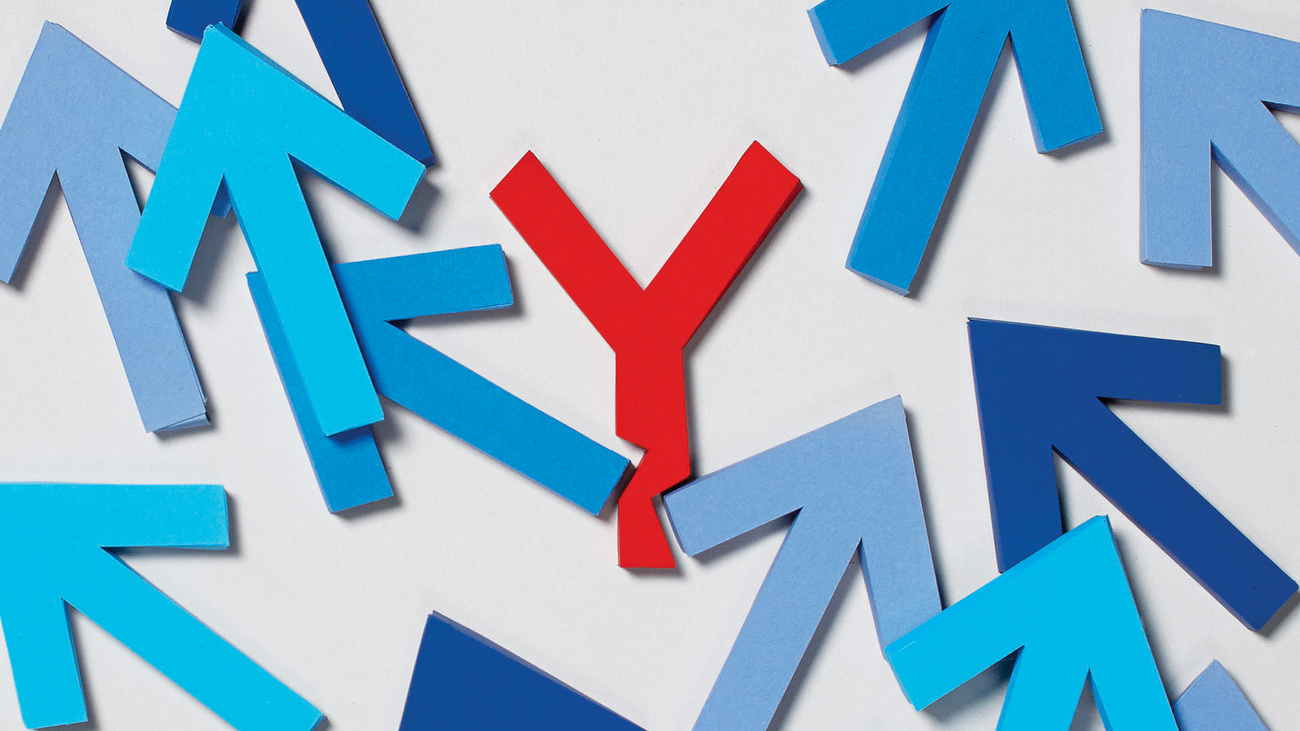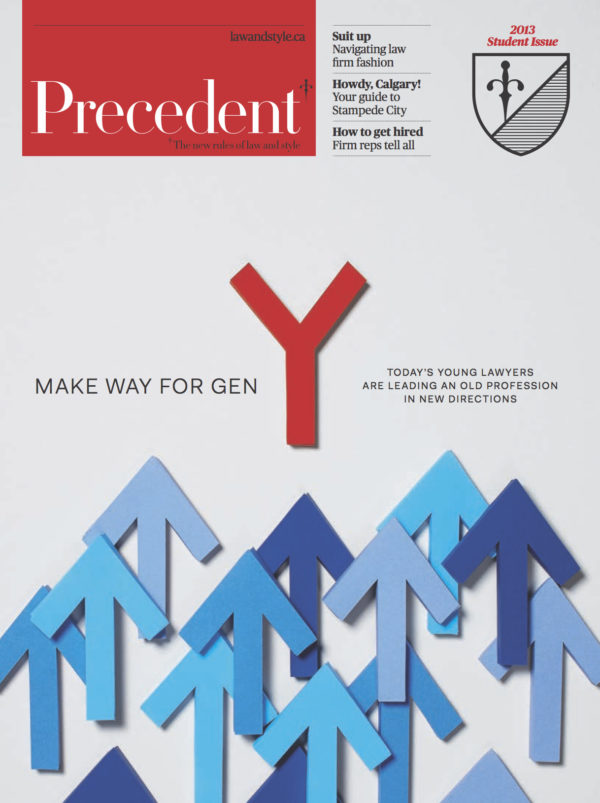
“Tests took we done passed those, expectations we smashed those…”
First-year Bennett Jones LLP associate Michael Lickver rips across the cool Miami surf in a speedboat. He’s flanked by two buxom ladies in bikinis, and he’s rapping about the perks of having finally made it to Bay Street.
“Big Cohibas like Castro, Canali suits where my cash go…”
You may be familiar with the surprisingly professional rap music videos about the journey from law student to associate that Lickver has been producing and starring in over the past few years. His video, “Law School Husslin 3,” released last fall, was filmed in Miami, New York and Toronto, received national and international press coverage from the likes of the Toronto Star and Gawker, and is sitting pretty with more than 55,000 views on YouTube. There’s a Lamborghini, a bling pool party and some pretty boastful lyrics:
“Stay positive like my cash flow so I’m never in arrears, and I be the only first-year with a senior partner beard.”
 A new lawyer still wet behind the ears might want to keep such cocky claims under wraps, but Lickver doesn’t feel the need to hide his colourful extracurricular activities from his superiors. “To be honest, I’ve gotten nothing but love,” says Lickver of Bennett Jones’ reaction to his hip-hop videos. He may even have received a supportive email directly from the firm’s CEO.
A new lawyer still wet behind the ears might want to keep such cocky claims under wraps, but Lickver doesn’t feel the need to hide his colourful extracurricular activities from his superiors. “To be honest, I’ve gotten nothing but love,” says Lickver of Bennett Jones’ reaction to his hip-hop videos. He may even have received a supportive email directly from the firm’s CEO.
It’s not like lawyers have never had personalities or interests outside of work, and Lickver may be a pretty extreme example of so-called Generation Y, but today’s young lawyers are bringing their whole, uncensored selves to the office. Often labelled Millennials, lawyers currently entering the workforce have different values and expectations from their predecessors and they’re pushing up against industry norms.
Lickver’s generation is not a small one: Millennials are loosely defined as those born between 1982 and 2000, and today they make up more than a quarter of the Canadian population. This means it’s not just the law that’s being tested — industries across the board are shifting to accommodate a soon-to-be dominant cohort that thinks, works and plays differently than its Boomer and Generation X predecessors. While not every single Millennial fits the stereotype, this is a group that grew up in relatively good economic times, came from mostly small families, were often told they were special, received comprehensive feedback on everything from schoolwork to their private piano lessons and had access to increasingly advanced technology since toddlerhood.
“Today’s young lawyers are bringing their whole, uncensored selves to the office.”
While younger generations have always had clashes with older cohorts, the difference here is that the speed of generational change is becoming more rapid and dramatic. “Historically, it took 20 to 30 years before the next generation changed. Now, we’re seeing behavioural differences in as little as 10 years,” says Nora Spinks, CEO of the Vanier Institute of the Family, a research firm in Ottawa that has worked extensively with the legal profession. Today’s new lawyers grew up with scheduled playdates and email while their bosses walked to school alone and can recall which of their neighbours was the first to get a TV.
Caught up in the generational rift are some of the most seminal aspects of law firm life. Issues like the concept of being yourself at work, the value of face time, following the partner track and buying into billable hours are on the line. Today’s young lawyers are pushing back against the status quo and firms are, as a result, in a state of flux. What’s on the docket for change and which traditions are holding strong?
Authenticity
 Getting hired at a law firm means being a good “fit,” and back in the day, being a good fit usually meant being white and male. There were also plenty of other unspoken rules dictating whether or not you’d be hired and accepted, mostly based on how well you could blend in with the crowd: Dress conservatively, join a golf club, keep quiet about politics and religion, and you’ll fit right in.
Getting hired at a law firm means being a good “fit,” and back in the day, being a good fit usually meant being white and male. There were also plenty of other unspoken rules dictating whether or not you’d be hired and accepted, mostly based on how well you could blend in with the crowd: Dress conservatively, join a golf club, keep quiet about politics and religion, and you’ll fit right in.
“Today, many early-year associates are willing to dress the part and speak corporate jargon, but cookie-cutter behaviours stop there..”
Our lives are more public now and Millennials don’t want to hide who they are when they’re at work. They want to be open about their sexual orientation, their politics, their hobbies and passions. They’ll speak openly about mental health issues and fertility treatments. And many, Lickver-style, put it all out there both in person and via social media.
“It’s very crucial that you can be authentic. Showing who you are allows you to really connect with people,” says Allison Wolf, president of Shift Works, a Vancouver-based company that coaches lawyers across Canada on business and leadership skills.
Firms are beginning to expand their definitions of fit when it comes to hiring. They’re realizing that offices open to lawyers with diverse backgrounds and experiences will resonate better with clients who are also becoming increasingly diverse. Many of the biggest deals may still be hatched on the golf course, but in the age of Lickver, some of the most interesting ones could be sparked on Twitter or LinkedIn.
Face time
 Being a lawyer involves putting in long hours at the office. Period. It’s a culture of working late, arriving early and showing your commitment with your actual physical presence. Not having your conservatively clad butt in the chair means you might miss out on assignments, important conversations and the chance to offer counsel. This always-at-work expectation means lawyers struggle with making it home at a reasonable hour to take care of the rest of their lives. Too bad: face time matters if you want to get ahead.
Being a lawyer involves putting in long hours at the office. Period. It’s a culture of working late, arriving early and showing your commitment with your actual physical presence. Not having your conservatively clad butt in the chair means you might miss out on assignments, important conversations and the chance to offer counsel. This always-at-work expectation means lawyers struggle with making it home at a reasonable hour to take care of the rest of their lives. Too bad: face time matters if you want to get ahead.
But armed with today’s tech arsenal — Skype, FaceTime and Google Talk — young lawyers (who grew up on instant messaging) are inevitably asking why these tools can’t allow them to work mostly from home or at a café in Paris as they see their colleagues in other sectors doing.
Second-year associate Miranda Callaghan has tried remote working: she recalls completing some of her tasks while articling for Torys LLP from the deck of her family’s cottage overlooking Georgian Bay. “It was a long weekend, and I just took my internet stick and worked from up there,” says the now 27-year-old. “I can work wherever I like. To me it’s an option I’ve always had, and it blows my mind to think of not having it.”
Right now, Callaghan admits being in the office most of the time works for her. “As someone very junior, I’ve never learned more than when a partner comes into my office and says, ‘This is great, let’s sit down and go over it.’ That needs to happen in person.” But looking ahead, Callaghan hopes to be able to occasionally work remotely, from home or the dock.
While lawyers from every generation love their tech toys, letting virtual tools take over client meetings is still a stretch for the industry. However, more firms are embracing the idea of mobile work in moderation: for the occasional afternoon off and for evenings and weekends. “It’s not unusual to walk down a corridor at 6 p.m. and find empty offices — both associates’ and partners’,” says Deborah Glatter, director of professional development and student programs at Cassels Brock & Blackwell LLP. “While face time is less important, connectivity and accessibility are much more important.”
Huge caveat: while the profession might become more flexible, the kind of reduced demands and hours that some young professionals want is not going to happen in private practice legal work. “Clients are coming to you with major problems with major consequences,” says Glatter. “It’s a competitive environment and only the best will do.”
 Partner track
Partner track
In the good ol’ days, a lawyer would arrive at a firm and stay there for his entire career. Those who still desire that path can expect to put in at least seven years’ worth of grueling work as an associate before even being considered for partner, as the path to partnership has grown longer in recent years. It doesn’t matter how clever or successful you are: the partnership process is lock-step at most firms, and nothing you do will speed it up.
But the Millennials are not the one-firm ponies of yesteryear. “I just started here,” says Callaghan of her position at Torys. “Who knows what will happen in the future?”
It’s a mindset that lawyer and career coach Sheena MacAskill sees frequently among newer lawyers. “They’re very mobile as a group, and they’re not looking beyond the two- or three-year horizon.”
“These lawyers are not risk averse,” agrees Glatter. She says that while her own generation found a job and held onto it for dear life, the Gen Ys likely witnessed their parents getting downsized. “They saw there was no loyalty from employers, and as a result we see a generation of lawyers who have no expectation they will be with their first employer for 35 years.”
Meanwhile, some newcomers simply don’t buy into the idea of partnership at all. Spinks was consulting with a firm when it heard rumours that five of its brightest young associates might leave. The firm quickly offered them early partnership. All five quit. “In their eyes, partnership was stifling,” says Spinks, who characterizes this cohort as one raised on the idea of endless choice.
While the partnership system is far, far from being uprooted by this young generation, firms are bending in small ways. “All firms have changed to be more transparent,” says Mary Jackson, chief officer of professional resources at Blake, Cassels & Graydon LLP. Everything from what you have to do to make partner to firm finances are being discussed more openly. “You have to make people feel more engaged by making them part of the decisions.” And longer term, MacAskill thinks the partnership admission rules may change as firms start to lose talent. “A merit-based system is what they’re looking for, and I don’t think that’s such a bad thing.”
 Billable hours
Billable hours
Much of the legal industry is built upon the billable hour and has been for decades. It’s reasonable to estimate that for every hour billed, an hour is spent on something non-billable, and the big firms still expect every lawyer to bill about 40 hours a week — a nearly impossible goal. It’s a system that rewards time spent, with zero incentive for working quickly and efficiently.
Grumbling about the system has been heard in the industry for some time, but it’s getting louder as young newcomers arrive with tech prowess in tow. “If you’re young, perhaps impatient, and able to use technology to work quickly, it’s easy to see the billable hour as rewarding time in the office rather than efficiency,” says MacAskill. “There’s a willingness among this generation to challenge that status quo.”
Chris Beneteau, a first-year lawyer at the Vancouver offices of Lawson Lundell LLP, says he and his peers simply work differently. “We grew up with technology, so we’re very good at multi-tasking, and quickly.”
MacAskill says someday the system will likely have to go as Millennials move up the ranks and ever-evolving tech tools continue to change law. “Firms don’t want to lose smart people,” she says. “It’s slow, but there’s no doubt that we’re seeing a change.” Spinks has heard talk in the industry of trying out project-based billing. She sees this slow but inevitable shift wrapped up in other changes.
“Eventually, the legal industry will view work as something that needs to be done, and done well, but how and where it gets done won’t matter.”
“You can tell Precedent that I’m setting them…”
Lickver and his crew aren’t kidding. He and his Gen Y buds are helping to reconfigure the profession. True, change isn’t happening fast, but it’s not being met with complete resistance either. Many law firms are being reinvigorated by this new crop of professionals and their particular views on technology, risk-taking and leisure time. “This generation is bringing energy and positivity and hard work,” says Jackson. Lickver agrees: “We’re young creative minds bringing something new to a historically conservative profession.” Law firms may never be the same. So rap on that.

This story is from the 2013 edition of PrecedentJD Magazine
Photography by Chris Tomaidis
Art by Kalpna Patel
